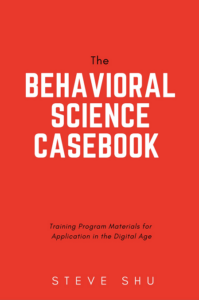In my free time I have been developing a course, tentatively called Applied Behavioral Science in the Digital Age to be taught to business school students at either the undergraduate or graduate level. In the course, students will study how the pervasive reach of digital technology into our lives affects our heuristics, biases and other behavioral patterns. In addition to learning about behavioral science theories in the digital age, students will then learn how to apply those key theoretical concepts through discussing actual, corporate case studies and participating in hands-on exercises related to nudging and experimental design. The class will discuss key elements to starting and implementing behavioral science initiatives within a company. The course will be especially geared toward those interested in professional careers within consulting, product development, marketing, services, and technology app (e.g., FinTech) settings.
As related to that course, I have started to develop a short book that will cover specimens and cases based on the real world, such as sample websites, app designs, email campaigns, and customer journeys with ideas about how to evaluate such designs though the lens of behavioral science. If you have interesting examples and specimens for me to consider including (can be disguised or made anonymous as needed), please feel free to correspond with me at sds77@cornell.edu. If the specimen is from your company and you are interested, I can potentially perform a behavioral audit on the materials provided.

